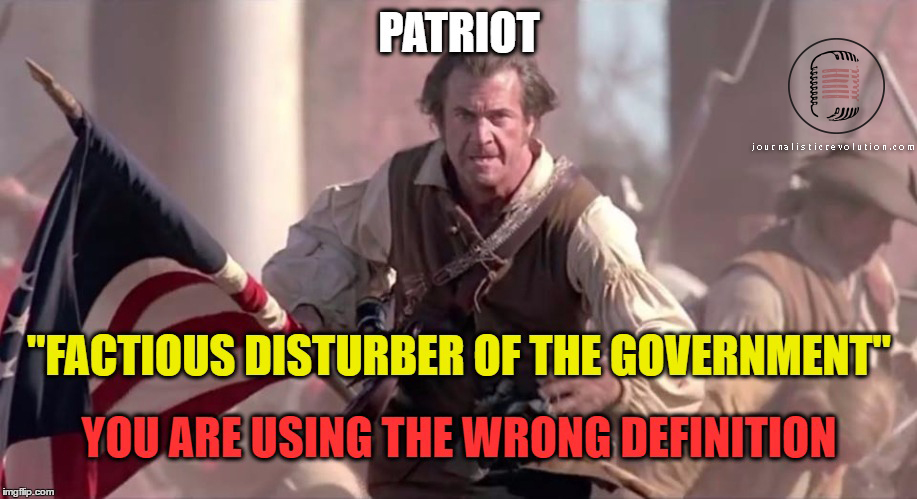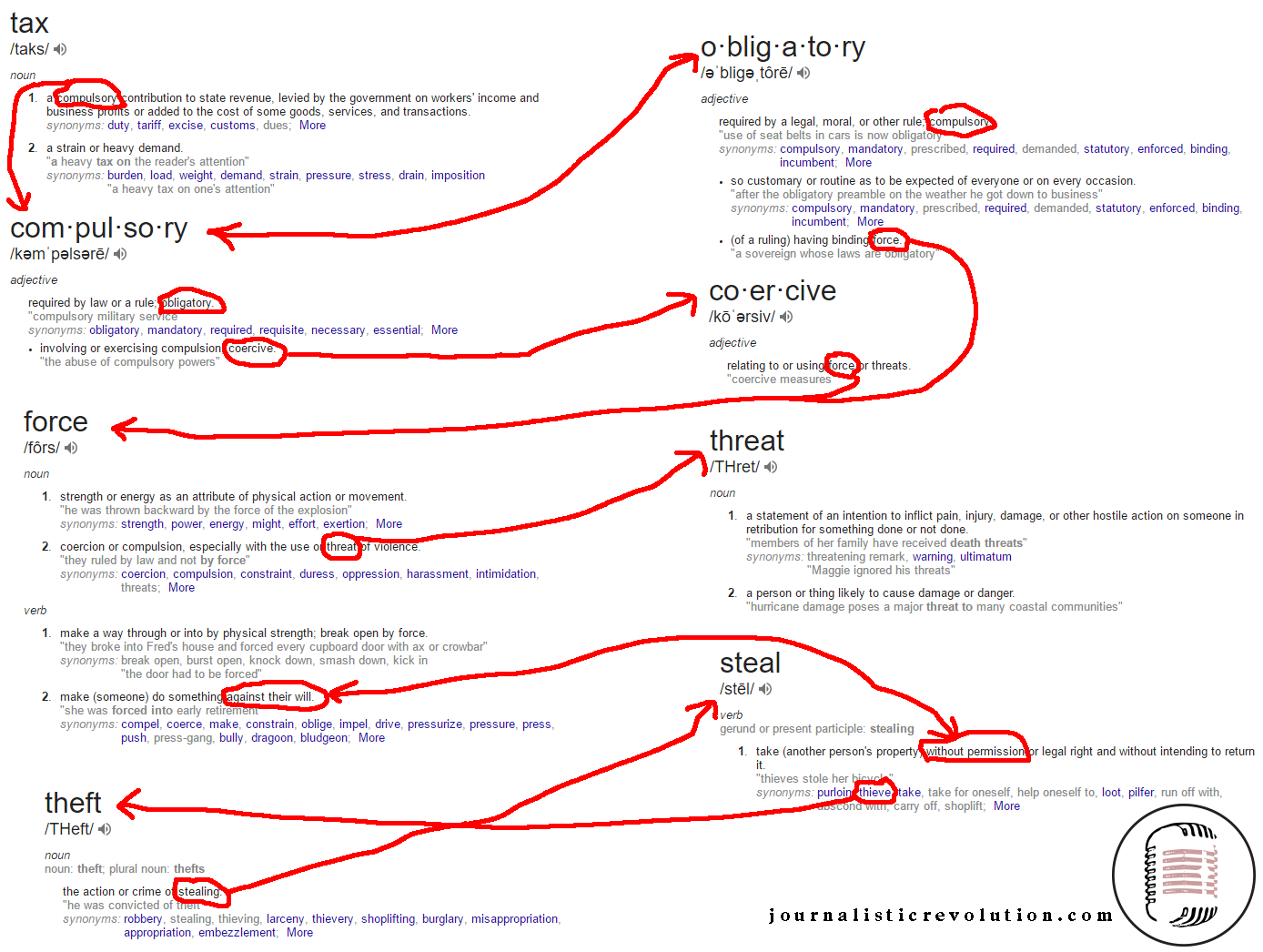
Rhetoric (TLDR): Taxation is theft. A tax was originally an additional charge of handling property (like a service fee) but taxation quickly became obligatory contributions paid to governments and churches, obligatory through force. The difference between the two meanings is voluntary vs obligatory. Free people can voluntarily choose what to do with their product of labor, their property, their capital, while slaves are forced to hand it over to their masters.
Did you know that Taxation Is Theft? It is, by definition. The very first article I ever wrote was a seven-pager on Why Taxation Is Theft. That article focuses more on examples on why Taxation Is Theft, lightly going over the definitions of the words, and options for moving away from taxation. It has been some time since I have addressed Taxation Is Theft and recently it has become a hot topic discussion, so I figured I should once again write about how Taxation Is Theft using the Trivium Method of Critical Thinking: Grammar, Logic, and Rhetoric in order. If you are unsure what the Trivium is or the concept please go research it, it is a life changer that is no longer taught to society.
Using only modern definitions of words is a subjective process due to everyone wanting to add their own twist. There is a problem with this process though, without objective truths, and the understanding of definitions, communication begins degrade quickly. When someone adds something to a definition of a word that you don’t agree with, how can you reach the same conclusion and rhetoric that they have without agreeing to the definition being used? This is why definitions need to be agreed upon before Logic can be debated.
Example: How often do you hear liberal being used as a negative term? How often is liberal used negatively without the sense of irony with it?
Root definition Liberal - directly from Latin liberalis "noble, gracious, munificent, generous," literally "of freedom, pertaining to or befitting a free person," from liber "free, unrestricted, unimpeded; unbridled, unchecked, licentious."
Modern Google definitions –
- “open to new behavior or opinions and willing to discard traditional values.”
- “favorable to or respectful of individual rights and freedoms.”
- “(in a political context) favoring maximum individual liberty in political and social reform.”
- “regarding many traditional beliefs as dispensable, invalidated by modern thought, or liable to change.”
- “(of education) concerned mainly with broadening a person's general knowledge and experience, rather than with technical or professional training.”
- “(especially of an interpretation of a law) broadly construed or understood; not strictly literal or exact.”
- “given, used, or occurring in generous amounts.”
- “(of a person) giving generously.”
Do you agree with all of the modern definitions of liberal? Do you think the left are liberals? You cannot be liberal with others’ property.
I tend to stay away from modern subjective definitions. These definitions usually have twists that alter the meaning of the word, so I focus on the root etymology of the words. This should always be your starting point when determining a definition to a word. Root definitions are objective truths, that is how the word started out and it sets the theme of the word for future use. Now, words can evolve to mean something completely different but words should never alter slightly meaning the opposite or something close to it. That is sophistry and is unacceptable, unless being used in an ironic way (see patriot).

Sophists have convoluted communication between us all by taking away the meaning and understanding of many commonly used words and terminology, which allows them to twist language into a rhetoric that suits their needs and goals. They are not here to tell you the truth. Socrates, Plato and Aristotle were vehemently against sophists since they deliberately used “fallacious reasoning, intellectual charlatanism and moral unscrupulousness,” subjectivism, to influence those they taught for a high price. These are not good people. They lie for gain to cloud the truth so their rhetoric is “correct.”
Google uses its own database to store definitions. Google is a publicly traded business heavily influenced by the governments around the world. It is a logical fallacy to go with Google definitions if it has not kept the same theme as the root definition. Take terrorism and patriotism for example, most use the words incorrectly which clouds the meaning of the word making a truthful rhetoric harder to obtain. This confusion causes disagreements and strife between everyone while reducing the judgement and critical thinking ability of each individual and society as a whole. Confusion and a breakdown in the ability to think critically makes people and society easier to control, I mean govern.
Example: Using modern definitions of the words Taxation Is Theft:

Now as I have stated previously, subjective definitions can be the truth, but you should always start with a word’s root etymological definition to understand the theme of a word, its use in the context of the situation, and how it changed to be used today. Terms must be agreed upon to have any meaningful debate. The root definitions of words matter because they are not subjective but objective truths based in reality. Luckily, you can see from the example that the theme of taxation has not really changed even though most don’t understand that Taxation Is Theft. For everyone to understand that Taxation Is Theft we must agree that “against their will” means the same thing as “without permission” when looking at the modern definitions of the words.
Now let’s go through the root definitions of Taxation Is Theft:
- Taxation (n.) early 14c., "imposition of taxes," from Anglo-French taxacioun, Old French taxacion, from Latin taxationem (nominative taxatio) "a rating, valuing, appraisal," noun of action from past participle stem of taxare (see tax (v.)).
- Tax (n.) early 14c., "obligatory contribution levied by a sovereign or government," from Anglo-French tax, Old French taxe, and directly from Medieval Latin taxa, from Latin taxare (see tax (v.)).
- Tax (v.) c. 1300, "impose a tax on," from Old French taxer "impose a tax" (13c.) and directly from Latin taxare "evaluate, estimate, assess, handle," also "censure, charge," probably a frequentative form of tangere "to touch," from PIE root *tag- "to touch, handle."
- Impose (v.) late 14c., "to lay (a crime, duty, obligation, etc.) to the account of," from Old French imposer "put, place; impute, charge, accuse" (c. 1300), from assimilated form of in- "into, in" (from PIE root *en "in") + poser "put, place".
- Obligatory (adj.) c. 1400, from Old French obligatoire "creating an obligation, obligatory," and directly from Late Latin obligatorius "binding," from obligat-, past participle stem of obligare (see oblige).
- Oblige (v.) c. 1300, "to bind by oath," from Old French obligier "engage one's faith, commit (oneself), pledge" (13c.), from Latin obligare "to bind, bind up, bandage," figuratively "put under obligation," from ob "to" (see ob-) + ligare "to bind," from PIE root *leig- "to bind.”
- Contribution (n.) late 14c., from Old French contribution and directly from Latin contributionem (nominative contributio), noun of action from past participle stem of contribuere "to bring together, add, contribute," from com "with, together" (see com-) + tribuere "to allot, pay" (see tribute)
- Compulsion (n.) early 15c., from Middle French compulsion, from Latin compulsionem (nominative compulsio) "a driving, urging," noun of action from past participle stem of compellere "compel" (see compel).
- Enforcement (n.) late 15c., "constraint, compulsion," from Old French enforcement "strengthening, fortification; rape; compulsion, coercion;" from enforcier; see enforce + -ment.
- Compel (v.) mid-14c., from Old French compellir, from Latin compellere "to drive together, drive to one place" (of cattle), "to force or compel" (of persons), from com "with, together" (see com-) + pellere "to drive" (from PIE root *pel- (5) "to thrust, strike, drive").
- Tribute (n.) mid-14c., "stated sum of money or other valuable consideration paid by one ruler or country to another in acknowledgment of submission or as the price of peace or protection," from Anglo-French tribute, Old French tribut and directly from Latin tributum "tribute, a stated payment, a thing contributed or paid," noun use of neuter of tributus, past participle of tribuere "to pay, assign, grant," also "allot among the tribes or to a tribe," from tribus (see tribe).
Rhetoric: A tax is considered a binding, forced, contribution that is compelled to be handed over to a government.
- Theft (n.) mid-13c., from Old English þeofð (West Saxon þiefð) "theft," from Proto-Germanic *theubitho (source also of Old Frisian thiufthe, Old Norse þyfð), from *theubaz "thief" (see thief) + abstract formative suffix *-itha (cognate with Latin -itatem; see -th (2)).
- Thief (n.) Old English þeof "thief, robber."
- Robber (n.) late 12c., from Anglo-French robbere, Old French robeor, agent noun from rober (see rob).
- Rob (v.) late 12c., from Old French rober "rob, steal, pillage, ransack, rape," from West Germanic *rauba "booty" (source also of Old High German roubon "to rob," roub "spoil, plunder."
- Steal (v.) Old English stelan "to commit a theft, to take and carry off clandestinely and without right or leave" (class IV strong verb; past tense stæl, past participle stolen), from Proto-Germanic *stelan (source also of Old Saxon stelan, Old Norse, Old Frisian stela "to steal, to rob one of," Dutch stelen, Old High German stelan, German stehlen, Gothic stilan "to steal"), from PIE *stel-, possibly a variant of *ster- (3) "to rob, steal."
- Pillage (n.) late 14c., "act of plundering" (especially in war), from Old French pilage (14c.) "plunder," from pillier "to plunder, loot, ill-treat."
- Plunder (n.) "goods taken by force; act of plundering," 1640s, from plunder (v.).
- Force (n.) c. 1300, "physical strength," from Old French force "force, strength; courage, fortitude; violence, power, compulsion" (12c.).
Rhetoric: Theft is the act of plundering, taking goods and property by force. If we used tax in its very root sense a tax should be voluntary since it was a service fee for handling something. You would have the option to choose someone or something else to handle your business. However, since taxation has become compulsorily and everyone is forced to contribute regardless if they use a service or not it is theft. Taxation is theft, by definition.
We as a society have forgotten how to think critically but the cards have been stacked against us since birth. This is only an excuse though because eventually we all need to wake up to the lies and falsehoods that are being forced upon us daily. We need to understand the disadvantage we have been given by those ruling over us. The Trivium Method of Critical Thinking is a way to gain back a level playing field. The Trivium allows us to process information so we can come to the best and most accurate solution with the information available. Grammar, Logic, and Rhetoric (in that order) are the foundation of this process.
Grammar must be factual and truthful, subjective opinions are not facts. Subjective words are not facts unless both parties agree to the definitions. Without proper Grammar basic communication breaks down and sets you up for failure. This failure manifests in our ability to use Logic leading to us providing rhetoric that is wrong.
P.S. Taxation Is Theft
My name is Jeffrey Hann and I'm an anarchist/voluntarist, Army veteran, business analyst, graphics and website designer, and content creator. I have a passion for truth and being logical, which eventually lead me to anarchism. I strive to live my life through voluntary actions and valuing rights. I own Journalistic Revolution (Facebook) and I can be found on Twitter|Instagram|Minds|Steemit|Keybase
If you enjoy my work please think about donating crypto:
- BTC address - 12TLd1xnRXSQZnVfMG8WRUNNF9k4YoKDsc
- ETH address - 0x589BA5535D507999c1413871390554225ae775F6


